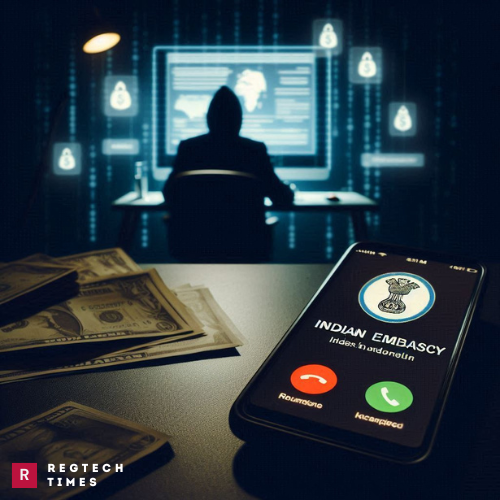The Indian Embassy in the United States has issued a warning about fraudulent calls from scammers pretending to be embassy officials. These fraudsters use fake phone numbers to make their calls appear as if they are coming from the embassy. Their goal is to trick people into giving away personal information or paying money by spreading fear.
Scammers claim there are mistakes in important documents like passports, visa forms, or immigration papers. They tell people that these errors need to be corrected immediately by paying a fee. If the person refuses, the fraudsters threaten them with deportation to India or imprisonment in the US.
Many Indian nationals living in the US and visa applicants have received such fake calls. The embassy has clarified that these calls are fraudulent and should be ignored. No official from the Indian Embassy will ever call and demand money or personal details over the phone.
How the Scam Works
Fraudsters use a trick called “spoofing,” which allows them to make their phone number look like it belongs to the Indian Embassy. Sometimes, the caller ID may show the embassy’s actual phone number (202-939-7000), but in reality, the call is from a scammer.
China’s ‘Spy Base’ Embassy: A Threat to UK’s Vital Communication Lines
These scammers pretend to be embassy officials and claim there is an error in a document such as a passport or visa form. To create panic, they warn that the mistake could lead to deportation or imprisonment. They then demand money to fix the issue immediately. Some fraudsters also ask for personal details like credit card numbers, passport numbers, or bank account details.
Scammers use pressure tactics to make people comply quickly. They may insist that immediate action is required to avoid severe consequences. Some fraudsters even pretend to transfer the call to another fake “officer” to make the situation seem more real.
Fraudsters Targeting Visa Applicants
Visa applicants have also been targeted. These fraudsters tell applicants that their application has issues and that an additional fee needs to be paid immediately. Since visa applicants are often anxious about their application process, they may believe these calls and fall victim to the scam.
These fraudulent calls are well-planned, with scammers using official-sounding language and terminology to appear credible. Some victims have reported that the fraudsters had knowledge of their basic details, possibly gathered from public databases or social media, making the calls even more convincing.
Scammers’ Deceptive Tactics
Scammers create urgency by threatening legal action, deportation, or imprisonment. They use official-sounding language and pretend to be high-ranking embassy officials. Some falsely claim they have information from Indian or US authorities about supposed document errors. Fraudsters may also request immediate payments through untraceable methods like gift cards or wire transfers. These tactics are designed to cause panic and make victims act without thinking.
Norway’s Espionage Betrayal: U.S. Embassy Guard Arrested for Spying
Steps to Stay Safe
The Indian Embassy has provided clear instructions on handling such fraudulent calls. People should not answer calls from unknown numbers claiming to be from the embassy. They should never share personal information such as credit card details or passport numbers over the phone. If someone threatens them with deportation or legal trouble, they should remain calm and not believe them. It is best to ignore and block such calls immediately.
If anyone receives a suspicious call, they should report it to the embassy by emailing cpers.washington@mea.gov.in with the subject “INFORMATION ON SPOOFED CALLS.” Visa applicants should only respond to emails from official embassy addresses ending in “@mea.gov.in.”
Raising Awareness and Prevention
To protect themselves, individuals should educate their family members, especially elderly people who may not be aware of such frauds. They should also stay updated with embassy advisories and never act in haste when they receive a suspicious call. If someone receives a call claiming to be from the embassy, they should verify the information by directly contacting the embassy through official channels.
The embassy urges people to spread awareness about these scams within their community. As scammers continue to change their tactics, staying alert and informed is the best defense.


